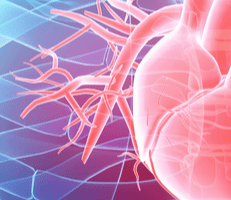Vein Center

Phoenix Heart
Cardiologists located in Glendale, Goodyear, Scottsdale, Anthem, Black Canyon City & Avondale, AZ
Sitting or standing for a long time, pregnancy, obesity, and hereditary factors can all increase your risk of developing vein problems in your legs. The vein center at Phoenix Heart is staffed with expert physicians who have helped many patients overcome leg pain and prevent serious complications due to venous disease. To schedule an appointment, use the online booking feature or call one of the offices in Glendale, Goodyear, Anthem, Buckeye, Laveen, Cottonwood, and Black Canyon City, Arizona.
Vein Center Q & A
What is Venous Disease?
Venous disease refers to several conditions affecting your veins. Veins use one-way valves to carry oxygen-depleted blood back to the heart. The valves keep blood moving in the right direction by opening to let blood go through, then closing to be sure it can’t flow backward.
When the valves become weak or damaged, they allow blood to go backward. As a result, blood builds up in the vein below the valve, which creates abnormally high pressure.
The pressure from accumulating blood, causes additional stretching of the vein walls and valves, allowing more blood to remain in the vein. With more swelling, valve damage, and excess blood, venous disease develops.
What Types of Diseases are Treated at the Vein Center?
These are a few of the most common problems treated at the vein center at Phoenix Heart:
- Chronic Venous Insufficiency: Chronic venous insufficiency generally refers to blood pooling in your veins due to weakened or damaged valves. This condition leads to other complications such as skin ulcers that don’t heal and varicose veins.
- Deep Vein Thrombosis (DVT): Thrombosis is an inflammation of a vein that develops due to a blood clot. Deep vein thrombosis is a very serious problem because the blood clot can break loose, lodge in your lungs, and block blood flow.
- Post-Thrombotic Syndrome (PTS): PTS develops when deep vein thrombosis damages the valves or vein wall. This damage remains and causes ongoing venous problems after the DVT blood clot is treated.
What Symptoms Develop Due to Venous Disease?
The most common symptoms of venous disease include:
- Leg pain
- Leg swelling
- Restless legs
- Aching or cramping in the legs
- Heaviness or a feeling of tiredness in the legs
- Burning or tingling sensations in your legs
- Tender areas around the affected veins
- Changes in skin color and texture
The visible signs of venous problems include spider veins, varicose veins, and venous ulcers. These skin ulcers typically appear near your ankle and they’re slow to heal, if they heal at all.
What is Lymphedema?
Lymphedema occurs when your lymph vessels are blocked. As a result, lymphatic fluids accumulate in tissues outside the vessels. You may develop swelling in your arm or leg, limited range of motion in the affected limb, aching or discomfort, and thickening of the skin. There’s currently no cure for lymphedema, so the team at Phoenix Heart works with you to manage your symptoms.
If you develop leg symptoms, call Phoenix Heart or book an appointment online.
Before & After Vein Center Treatment
Cardiology Services
-
 Cardiovascular Labmore info
Cardiovascular Labmore info -
 Congestive Heart Failuremore info
Congestive Heart Failuremore info -
 Electrophysiologymore info
Electrophysiologymore info -
 Heart Attackmore info
Heart Attackmore info -
 Nuclear Medicinemore info
Nuclear Medicinemore info -
 Clinical Researchmore info
Clinical Researchmore info -
 Structural Heart Defectsmore info
Structural Heart Defectsmore info -
 Ultrasound Testingmore info
Ultrasound Testingmore info -
 Echocardiogrammore info
Echocardiogrammore info -
 Vein Centermore info
Vein Centermore info -
 Women’s Heart Healthmore info
Women’s Heart Healthmore info -
 High Blood Pressure/Hypertensionmore info
High Blood Pressure/Hypertensionmore info -
 High Cholesterolmore info
High Cholesterolmore info -
 Coronary Artery Diseasemore info
Coronary Artery Diseasemore info -
 Stress Testingmore info
Stress Testingmore info -
 Weight Lossmore info
Weight Lossmore info -
 Arrhythmiamore info
Arrhythmiamore info -
 Atrial Fibrillationmore info
Atrial Fibrillationmore info -
 Peripheral Vascular Disease (PVD)more info
Peripheral Vascular Disease (PVD)more info -
 Chest Pain/Anginamore info
Chest Pain/Anginamore info -
Lymphedema & Phlebolymphedemamore info
-
Compression Stockingsmore info
-
Diagnostic Testingmore info
-
Interventional Cardiologymore info
-
Peripheral Arterial Diseasemore info
-
Bradycardiamore info
-
Tachycardiamore info
-
Ventricular Fibrillationmore info
-
Weight Management with Enara Healthmore info

































